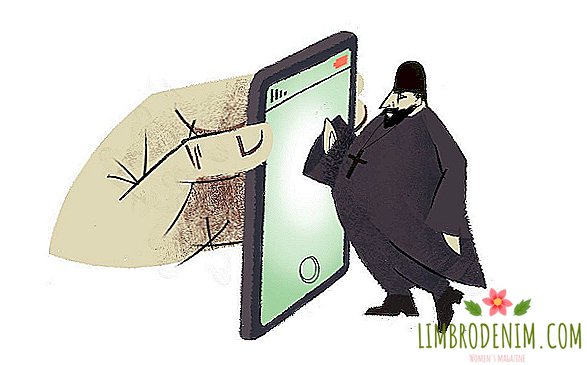Online Prayer: How to Make Religious Services on the Internet
Religious life on the Internet does not stand still. Parishes and monasteries take orders for demands (requests for prayers) and prayers, fathers lead vlogs, and on instagram there are a lot of announcements with proposals to take the notes to the temples of Jerusalem. It is not surprising if one day large companies launch new platforms, Uber Church or Yandex.Molitva, all the more so since the iTrebs iPhone application already exists.
The question of how ethical it is to transfer religious services online remains open. On the one hand, believers can see in this an attempt to move away from the canon. On the other hand, websites accepting orders for memos and prayers online help religious people who for various reasons do not have the opportunity to go to the temple on their own. Finally, no one is immune from fraud. We decided to figure out who and why is launching commercial projects in the sphere of religious services, which of them are supported by the ROC, and which ones turn out to be ordinary tricks.

Send a note

Two years ago, Evgenia Belova moved with children to Israel. In the first year of life in a new country, Evgenia was rebuilt for a long time, working on cleaning houses and teaching dances. Once a friend asked her to carry notes to the Wailing Wall as a joke - in the gap between the stones of the Jerusalem shrine it is customary to put notes with requests to God. “It was just the thirty-first of December. And my first birthday is January,” recalls Yevgeny. “Ksenia Bezuglova congratulated me on her birthday (instagram blogger. -Note ed.) and asked to put a candle for her. I decided to share this idea with her. She said that she likes and is ready to tell her readers about it. An hour later, I started writing people with requests. I could not understand what was the matter. I look, and Ksyusha has already made a post about me. And this is how this project appeared. "
"Message Online" Eugene promotes in instagram, and takes orders through the site. Eugene works without a fixed price for services - for donations. Each client receives a detailed video report on how Eugene left a note or a candle in a particular temple. One of Evgenia’s clients, Olga Apryshko from the village of Rassypnoe in the Rostov region, says that she found the project by chance on instagram: “I don’t have the opportunity to go to Jerusalem myself. I decided that since there are such good people, you should take the opportunity”. However, she admitted that there were doubts: "I met such services for the first time, I had never seen anyone else before. But then I studied the page and the site. I realized that I was not the only one, and the doubts left. If there is a possibility, why not to take advantage, especially since no one asks for millions. "
“They translate everything differently: who is fifty rubles, and who is fifteen thousand,” says Yevgeny. “I leave part of the money in the churches, part I send to Xenia Bezuglovaya’s fund,“ Everything is possible, ”and the rest covers the cost of gasoline and the assistant’s payment If something remains, then it goes to me as a salary. But in Israel, in any case, prices are very different from Russia. For example, I really want to fly home, but so far I have no such opportunity. " Eugenia says that she was offered cooperation in Russia: “Other projects wanted to send notes to me, but I had to switch to a fixed price. I said that I could not work that way. After all, I write that if a person does not have the opportunity to transfer money for my work, it's not scary. You just need to do a good deed to someone from your environment. It's all on their conscience. "
“Yesterday there was a note from a woman who had already sent a note seven months ago. She then requested that her son be given a suspended sentence. Yesterday, a request that the prosecutor’s office arrange a suspended sentence”
With the fact that for religious services, such as the ability to put a candle in the temple, you need to give money, every believer came across. This is a well-established practice, which, nevertheless, is not considered a payment for services - it is a donation, which at the same time means that the believer is ready to give a gift to God, and helps the temples to pay expenses.
A similar project "Jerusalem Shalom" exists not on donations of any amount, but as a full-fledged online store. In addition to the red threads (the Jewish talisman, which, it is believed, should protect against the evil eye), consecrated candles and other themed products for forty-five shekels (approximately 800 rubles), the client is offered to send a note to the Wailing Wall, the Holy Sepulcher or the Divided column at the entrance to temple. Notes are transmitted on the day of the order and in the evening they send a video report. Alina Teplova, one of the creators of the project, says that this is far from the limit: "You can buy holy water or order a prayer or other special service. Non-standard orders can be very different and surprising. For example, for one client we bought soap for psoriasis from mud of the Dead Sea, consecrated it in the temple and then later sent it to her. "
Just like Eugenia Belova, the idea of the project came to Alina after a few years of living in Israel: “We started to look at what is on the Internet and realized that very few people actually work from Israel. Many send notes in large bundles and through someone. They even sometimes turn to us - they say, we have already found clients, we have already been paid, we just need to take all of this. If you just enter the phrase “red threads" in a search engine, a huge number of pictures will pop up - threads in different packages with prayers, stamps, stamps. I don’t. It's all local Russian or someone else’s handmaid. It was obvious how much everything is fake, and I wanted to do something real. " It is really difficult to check how honest those who promise to deliver the red thread from Israel: the one who makes the order cannot track the process itself.
Both women claim that they have never received comments about insulting believers' feelings or criticizing them. According to Alina Thermal, clients, on the contrary, write grateful reviews: “Someone after requests then simply sends thanks, and this is very pleasant. And it happens that the next request comes up. For example, yesterday there was a note from a woman who had already sent a note seven months ago. She then asked her son to be given a suspended sentence. Apparently, the family had limited financial resources and there was no money to hire a lawyer. Yesterday there was again a note asking her that the prosecutor’s office would arrange a suspended sentence . Like this I sequence. "

Put a candle

In Russia, projects that provide religious services online have a mixed history. On the one hand, back in 2013, Patriarch Kirill announced the importance of the presence of the church in the online space. On the other hand, not every such initiative manages to receive a church blessing.
Seven years ago, Anna Vinokurova studied at the Higher School of Economics on the program "Management in the field of e-business and Internet projects." As a pilot project, they came up with a fellow student and developed the site "Put a Candle". The functionality of the site was simple: choose the type of candle and one of the three churches in Moscow, you could add a note with a request. After confirming the payment, the courier went to the indicated temple and set a candle, then the customer received a photo confirmation. “We didn’t hope to earn money right away,” answers Anna to the question whether the project brought in earnings. “At first, we just studied the market. To do this, we set a minimum price, which conditionally included courier delivery and the cost of the candle itself. We wanted to understand how people would perceive this idea. "
Anna and her colleagues also tried to get the support of church representatives and agree on possible cooperation, but they did not succeed. At the same time, the Pussy Riot trial began, and later, in 2013, they decided to close the project completely. Anna believes that, most likely, at that time neither the church nor the society were fully prepared for their idea: "Everything that exists today may have begun to develop later. In our time there were only projects that offered to put a virtual a candle: just a candle lit up on the site, beautifully painted in a flash. Maybe we initiated a conversation on this topic with our project, gave us an idea, and similar services began to develop. "
"Today it is already perceived as the norm. But the danger lies in the services that take confession online. This is a violation of the canons and blurring the boundaries of the permissible"
At the same time, in the middle of 2013, two parishioners of the Church of the Resurrection of Christ in Sheremetyevo in Moscow tried to develop parish life. They decided to create the first Orthodox social network. Less than a year later, in May 2014, the official launch of the “Yelitsa” social network took place. At the same time, the blessing of Patriarch Cyril was received. Today "Yelitsy" unites more than two hundred thousand users, nineteen thousand churches and monasteries and eleven thousand active parish communities. The network includes a charitable foundation, its own media, a pilgrimage service and also "Yelitsy Zapiski" - online ordering service.
According to Natalya Chizh, the Yelitsa network spokesperson, Yelitsy Zapiski was created by numerous requests from social network users: “The service helps people living in remote regions of Russia or in other countries to apply for prayer help in temples and monasteries and order online requirements. Our project has established friendly relations with many monasteries of the Russian Orthodox Church, as well as the monasteries of the fraternal Churches. " The cost of the service requires a commission and, on average, is higher than in the temples. The commission covers taxes from the transfer, bank commission, payment for the work of moderators and deductions to the Yelitsy charitable foundation. Now twenty temples and monasteries take part in the service. According to Natalya, the presence of the Church on the Internet will actively develop further: “Today it is already perceived as the norm. Further new sites will be mastered and new technologies will be introduced. But the danger lies in the services that receive confession online. This is a violation of canons and blurring the boundaries of acceptable” .
These are far from the only services offering online services related to Orthodoxy. There are, for example, fully virtual chapels where you can put candles and choose prayers. Several temples, such as, for example, the Church of All Saints in the Russian land that shone in Novokosin, offer to order a public prayer officially and directly - for this you need to fill in the data and leave the recommended amount of donations. There are also online broadcasts of services - you can join and watch them on a schedule. In the comments to the broadcasts of worship, you can find many words of gratitude. Some visitors say that they cannot go to church because of health or family circumstances, others say that they do not live in Russia and far from Orthodox churches. Those who are dissatisfied with the fact of the online broadcasts, units.

Order prayer

Four years ago, Oleg Barinov from St. Petersburg was looking for the phone of St. Nicholas Church on Dolgozerna Street to find out the schedule of services. But instead of the site of the Russian Orthodox Church, he came to a site with a similar name - the resource suggested ordering prayers and prayers in churches and monasteries throughout Russia. At the same time, according to Oleg, the service is offered indiscriminately, the existing church or not - the order can be made, including in the museum church of St. Basil or in the Archangel Cathedral of the Kremlin. In principle, some of the worship services offered can never be read in temples.
“I cannot say that I was surprised or indignant at the very fact of the existence of this site. For example, I already heard about the order of notes on the Optina Pustin site,” Oleg recalls. “But how it was done led me in sincere confusion. " Oleg contacted the creators of the site and asked them questions about their work and about the legality of using the name: "The impudence and impudence of the creators of the site and the whole manner of conducting a dialogue, in which everything indicated impunity of these people, led me to at least try to achieve the truth."
In the office of the Russian Orthodox Church Oleg confirmed that the site is unknown to them, and gave permission to contact the law enforcement agencies. Oleg appealed to the prosecutor. He says that right after this, his mail and social media accounts were hacked and messages were sent to defame him and his family. Oleg suggests that this could be directly related to the results of his activities. On Oleg's appeals, his work was noticed by the ROC: “Already on the basis of a statement from their lawyers, the prosecutor’s office checked and referred the case to court. As a result, the legal entity through which the site worked was closed, and an information letter was sent to all the dioceses. Unfortunately, the company has re-registered and continues to exist. " As Oleg explains, now on the website there is no possibility to choose a particular temple, and when ordering a note, the person does not know which temple she is ordering.
"A person who prefers to order a note remotely is waiting for a number of dangers. First of all, fraudulent organizations are very difficult to control."
After this story, Oleg began to check other similar sites, and share the results on thematic Orthodox forums: “If I’ve been told a couple of years ago that I’m going to be a witch hunter, I would have laughed heartily. My wife sometimes makes fun of me, but I’m not offended. Despite several of my articles on the forums, I can’t say that this has become my hobby. No, I didn’t become an indifferent person. It’s just that the law enforcement agencies must protect us from scammers. the streets. Take at least ryazhe s priests, collecting donations, or fake cripples at the entrances to all the major temples. " According to Oleg, it is important to raise the level of legal and computer literacy of the population: “What can we say about fraud on the Web, where people themselves give rogues money. But it’s enough just to pay attention to distinguish a real website from a scam.”
Vakhtang Kipshidze, deputy chairman of the Synodal Department for Church Relations with Society and the Media, believes that the spiritual life of a person is not limited to the remote submission of notes: "Unfortunately, many who resort to this service have a false impression that their righteousness and churchliness is measured the amount of donations and the number of prayers ordered in different monasteries. This is a sad delusion. The world of spiritual tradition is much richer and more interesting. It is always better to go to the temple and fully participate parish life, which is radically different from the Internet communication. Of course, if someone can not come to the temple itself, including on the grounds of old age or state of health, he or she can take advantage of this service. "
According to Kipshidze, the Synodal Department sometimes receives allegations of alleged fraud: “A person who prefers to order a note remotely faces several dangers. First of all, these are fraudulent organizations that claim to donate money to fulfill the requirements. It’s very difficult to control the flow of these funds We receive information, but mainly in the form of suspicion that fraudulent actions are being carried out on a particular resource. Unfortunately, it can be difficult to track down and bring to criminal administrative or administrative responsibility. "
In order for online services to become widespread, not all clerics are ready. Many believe that replacing a real trip to the temple with a virtual one is unacceptable - and if communication with a priest through social networks is acceptable, then virtual chapels cannot replace him. “A person still has to work. And in spiritual life too. Feet to come to the temple, stand, pray,” says priest Dmitry Shishkin. “If a person is disabled, I agree, he can communicate via the Internet. But replace the real prayer with online communication cannot. A person on this site writes: "I live in Chelyabinsk and ordered a forty-minute net in the Cathedral of Christ the Savior." Why can't I order in Chelyabinsk? What is the difference? "





